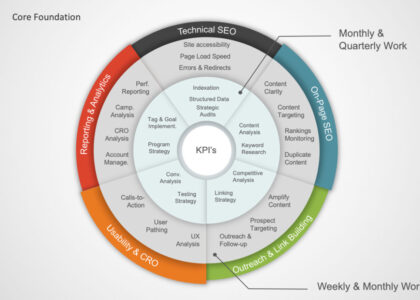The Importance of Analysing SEO for Your Website
Search Engine Optimization (SEO) is a crucial aspect of any successful online presence. It involves the process of improving your website’s visibility in search engine results pages, ultimately driving more organic traffic to your site. However, simply implementing SEO techniques is not enough; it is equally important to regularly analyse and monitor your SEO efforts to ensure optimal performance.
Why Analyse SEO?
By analysing your website’s SEO performance, you can gain valuable insights into how well your site is ranking on search engines, the effectiveness of your keywords, and the overall user experience. This analysis allows you to identify areas for improvement and make informed decisions to enhance your website’s visibility and reach a wider audience.
Key Metrics to Analyse
When analysing SEO, there are several key metrics that you should pay attention to:
- Keyword Rankings: Monitor how well your target keywords are performing in search engine results pages.
- Organic Traffic: Track the amount of organic traffic coming to your site and identify trends over time.
- Backlink Profile: Evaluate the quality and quantity of backlinks pointing to your site, as they play a significant role in SEO.
- User Engagement: Analyse metrics such as bounce rate, time on page, and conversion rates to understand how users interact with your site.
The Benefits of Regular Analysis
Regularly analysing your website’s SEO performance offers several benefits:
- Identifying Opportunities: By pinpointing areas that need improvement, you can capitalise on opportunities to enhance your website’s visibility and attract more visitors.
- Monitoring Progress: Tracking key metrics allows you to monitor the effectiveness of your SEO strategies and make adjustments as needed.
- Gaining Insights: Analysing SEO data provides valuable insights into user behaviour, keyword performance, and competitor activity, enabling you to make data-driven decisions.
In Conclusion
Analysing SEO is essential for maintaining a competitive edge in today’s digital landscape. By regularly monitoring key metrics and making data-driven decisions, you can improve your website’s visibility, attract more organic traffic, and ultimately achieve greater online success. Invest time and resources in analysing your website’s SEO performance – the results will be well worth it!
Top 5 Tips for Effective SEO Analysis
- Regularly monitor keyword rankings to track performance.
- Analyse website traffic data to identify trends and opportunities for improvement.
- Audit on-page elements such as meta tags, headings, and content quality.
- Evaluate backlink profile to ensure quality and relevance of incoming links.
- Stay updated with search engine algorithm changes to adjust SEO strategies accordingly.
Regularly monitor keyword rankings to track performance.
Regularly monitoring keyword rankings is a fundamental aspect of effective SEO analysis. By keeping a close eye on how well your target keywords are performing in search engine results pages, you can gain valuable insights into the effectiveness of your SEO strategies. Tracking keyword rankings allows you to identify trends, assess the impact of your efforts, and make informed decisions to improve your website’s visibility and attract more organic traffic. Consistent monitoring of keyword performance is key to staying competitive in the ever-evolving digital landscape and ensuring that your website remains relevant and accessible to your target audience.
Analyse website traffic data to identify trends and opportunities for improvement.
Analysing website traffic data is a valuable strategy in SEO to uncover trends and pinpoint areas for enhancement. By delving into metrics such as organic traffic sources, user engagement patterns, and conversion rates, you can gain insights that reveal opportunities for optimisation. Identifying trends allows you to adapt your SEO strategies effectively, ensuring that your website remains competitive and continues to attract a wider audience. Regular analysis of website traffic data is key to staying ahead in the ever-evolving digital landscape and maximising the impact of your SEO efforts.
Audit on-page elements such as meta tags, headings, and content quality.
To enhance your website’s search engine optimisation (SEO) performance, conducting an audit of on-page elements is crucial. This involves evaluating key components like meta tags, headings, and content quality to ensure they are optimised for search engines and user experience. By reviewing and refining these elements, you can improve your website’s visibility, relevance, and overall ranking in search engine results pages. Regularly auditing on-page elements is a fundamental step in enhancing SEO effectiveness and attracting more organic traffic to your site.
Evaluate backlink profile to ensure quality and relevance of incoming links.
To effectively analyse SEO, it is crucial to evaluate the backlink profile of your website to ensure the quality and relevance of incoming links. Backlinks play a significant role in search engine rankings, and by assessing the sources and authority of these links, you can determine their impact on your site’s SEO performance. Focusing on acquiring high-quality, relevant backlinks can help improve your website’s credibility and visibility in search engine results pages, ultimately driving more organic traffic to your site.
Stay updated with search engine algorithm changes to adjust SEO strategies accordingly.
It is crucial for website owners and digital marketers to stay updated with search engine algorithm changes to adjust their SEO strategies accordingly. Search engines frequently update their algorithms to improve user experience and deliver more relevant search results. By keeping abreast of these changes, businesses can adapt their SEO tactics to align with the latest requirements and best practices, ensuring that their websites remain visible and competitive in search engine results pages. Regularly monitoring algorithm updates and making necessary adjustments can help maintain or improve website rankings, drive organic traffic, and ultimately enhance online visibility and success.






